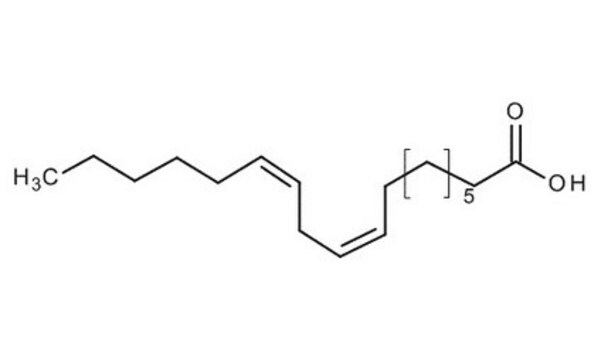27728
Oleic acid
meets analytical specification of Ph, Eur., 65.0-88.0% (GC)
Synonym(s):
cis-9-Octadecenoic acid, Elainic acid
About This Item
Recommended Products
vapor pressure
1 mmHg ( 176 °C)
Quality Level
description
peroxide value <= 10
Assay
65.0-88.0% (GC)
form
liquid
quality
meets analytical specification of Ph, Eur.
composition
fatty acids w. 1 chain > C18, ≤4.0% GC
linoleic acid, ≤18.0% GC
linolenic acid, ≤4.0% GC
margaric acid, ≤4.0% GC
myristic acid, ≤5.0% GC
oleic acid, 65.0-88.0% GC
palmitic acid, ≤16.0% GC
palmitoleic acid, ≤8.0% GC
stearic acid, ≤6.0% GC
impurities
residual solvents, complies
ign. residue
≤0.1%
color
clear
refractive index
n20/D 1.459 (lit.)
bp
194-195 °C/1.2 mmHg (lit.)
mp
13-14 °C (lit.)
acid value
195‑204
iodine value
89‑105
density
0.89 g/mL at 25 °C (lit.)
suitability
complies for appearance of solution
in accordance for fatty acid composition
passes test for identity
SMILES string
CCCCCCCC\C=C/CCCCCCCC(O)=O
InChI
1S/C18H34O2/c1-2-3-4-5-6-7-8-9-10-11-12-13-14-15-16-17-18(19)20/h9-10H,2-8,11-17H2,1H3,(H,19,20)/b10-9-
InChI key
ZQPPMHVWECSIRJ-KTKRTIGZSA-N
Gene Information
human ... SOAT1(6646) , SOAT2(8435)
Looking for similar products? Visit Product Comparison Guide
General description
Application
Other Notes
Storage Class Code
10 - Combustible liquids
WGK
WGK 1
Personal Protective Equipment
Regulatory Listings
Regulatory Listings are mainly provided for chemical products. Only limited information can be provided here for non-chemical products. No entry means none of the components are listed. It is the user’s obligation to ensure the safe and legal use of the product.
FSL
Group 4: Flammable liquids
Type 3 petroleums
Hazardous rank III
Water insoluble liquid
JAN Code
27728-2.5L-R:
27728-1L-R:
27728-6X1L-R:
27728-25KG-R:
27728-4X2.5L-R:
27728-VAR-R:
27728-BULK-R:
Choose from one of the most recent versions:
Already Own This Product?
Find documentation for the products that you have recently purchased in the Document Library.
Customers Also Viewed
Our team of scientists has experience in all areas of research including Life Science, Material Science, Chemical Synthesis, Chromatography, Analytical and many others.
Contact Technical Service









